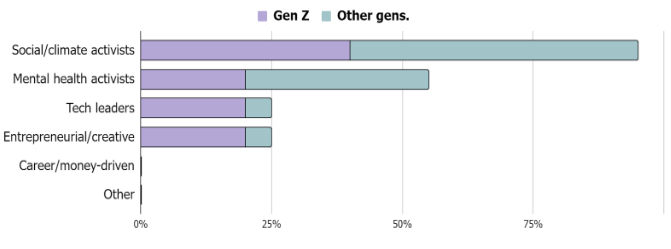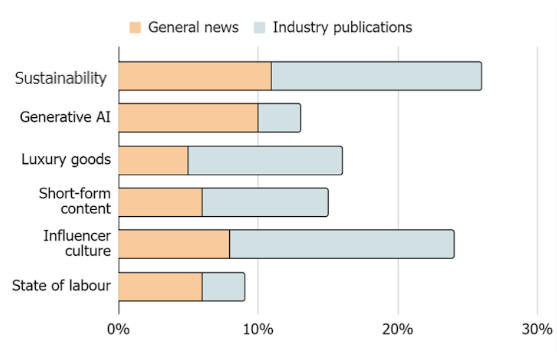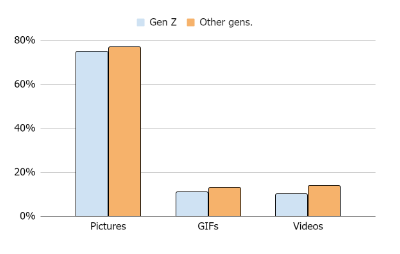The ABCs of building authentic connections with Gen Z
Gen Z: Ethically-led consumers, unmoved by traditional methods of influence, with super-short attention spans. Are these accurate summaries of the age-group or media-driven stereotypes?
In our latest Vuelio webinar, ‘How to build authentic connections with Gen Z’, our Insights content lead Hollie Jennifer Parry shared new research on the demographic to help you connect with the younger generation.
The findings presented in the webinar are a small excerpt from our new whitepaper: A guide to Gen Z engagement. Using our bespoke audience analysis tools, the Insights team compared how media and comms industry perceptions of Gen Z line up to reality; outlining the biggest misconceptions along the way.
Here’s just a few of the key insights:
1. Gen Z personas are fluid and dynamic
As part of our research, we asked 55 PR & comms directors what they thought about the demographic, then asked the same of Gen Z themselves.
Our findings showed that Gen Z are perceived as social/environmental activists with low monetary drive, and probably more politically active than other generations. They’re seen as less loyal to particular brands, and much more likely to click on short-form and mobile-first content. TikTok and Instagram are seen as the most influential platforms, with AI personalisation, Web3, and AR/VR likely to be vital for getting their attention in the next few years.
2. Generative AI is a concern for everyone — beyond the comms industry

*research outlines what Gen Z think about themselves vs. the perceptions of non-gen Z PR & comms directors.
For the most part, Gen Z agreed that social-environmental issues drive their values. However, a common consensus across the demographic is that there should be less of a focus on fixed personas and more consideration of how dynamic life is through early adulthood.
In other words, they’re aware that who they are now can change at any given moment and will continue to do so; so leaning into that experience could prove more fruitful for brands than trying to tie down a fixed set of behaviors or personality traits. This perspective has been widely discussed by Gen Z journalists, too – calling it a ‘great irony’ that the industry continues to use labels to capture a generation ‘defined by fluidity’.

While some may think it’s becoming a worn-out topic, sustainability continues to be the highest-reaching media discussion across general news and comms publications. Surprisingly, concerns around generative AI and the state of the Gen Z labour force were more often covered in general news publications.
However, topics like luxury retail and influencer culture were highly discussed across comms industry publications, with a particular focus on the ‘paradox’ of record-high fast fashion consumption in a sustainability-focused generation.
But how do Gen Z see themselves? Our findings showed that 90% of Gen Z would agree it’s ‘somewhat accurate’ that they lack patience and expect instant results, compared to 45% of other generations.
80% of Gen Z think influencers have a strong impact, compared to 50% of other generations.
While these observations are reflective of Gen Z as a general population, following this guidance alone could be damaging to your reputation. There are significant nuances to the demographic across industries – emphasising the need for thorough audience analysis specific to your brand.
3. Short-form doesn’t always take the lead
We explored the finance sector, known for a variety of Gen Z engagement styles, to demonstrate why wider perceptions of the demographic don’t always apply and the missed opportunities that can arise without sector-specific audience analysis.

While Tiktok is a primary platform for financial information, research from 295,000 Gen Z X profiles showed that infographics were circulated at a significantly higher degree than video content.
Another surprising discovery was that while otherwise highly valued, Gen Z were 8% less likely to follow influencers in the finance sector than other generations. Unlike some other influencer cultures, the leading names in the finance sector are qualified experts — such as Martin Lewis and Deborah Meaden. Given that 83% of Gen Z have encountered financial misinformation online, a push towards some of these reliable influencers could greatly assist the issue.
Check out the full whitepaper for further insights, including seven top tips on how to increase your Gen Z engagement going forward.
Audience analysis is one of six report types offered by the Vuelio Insights team. Learn more about how our group of experts can help you build long-lasting, authentic relationships with Gen Z and beyond.





Leave a Comment